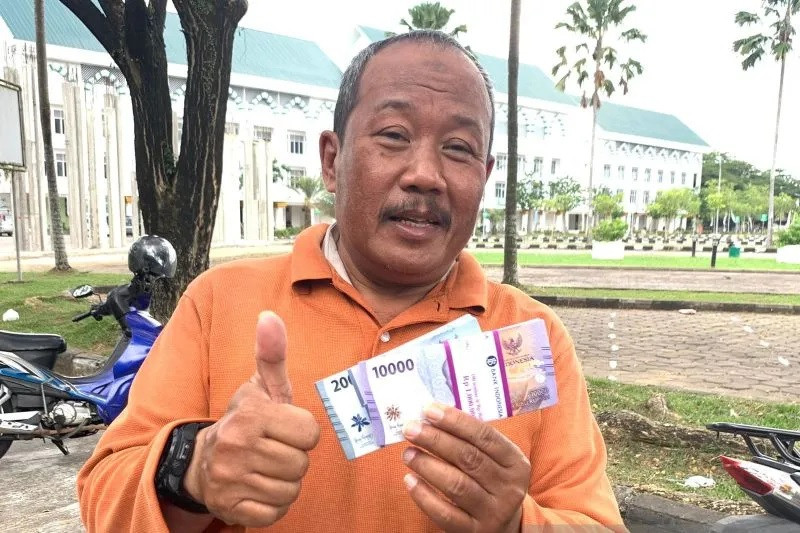Popular Reads
Top Results
Can't find what you're looking for?
View all search resultsPopular Reads
Top Results
Can't find what you're looking for?
View all search resultsIndonesia still gunning for fourth-largest economy by 2045
Experts consider improved human capital vital for achieving higher GDP growth.
Change text size
Gift Premium Articles
to Anyone
P
resident Joko “Jokowi” Widodo has long expressed his ambition for Indonesia to become the world’s fourth-largest economy by 2045, when the country marks its centenary of independence, and after years of global turmoil that saw the dollar rise against most emerging market currencies, the government has not abandoned that goal.
Setting his sights on a nearer target, Jokowi said in August last year that the government was vying for the seventh spot by 2030. He noted the importance of building more roads, ports and airports in achieving that goal.
“The foundations to compete with other countries must be arranged and built. Because in the future, it won't be big countries defeating small countries or rich countries beating poor countries. The battle will be fast countries beating slow countries,” said the President on Aug. 5, 2022, as reported by Tempo.
The President’s target looks like a tall order, given that a tool on the International Monetary Fund’s website based on data from an IMF report published in late 2022 only sees Indonesia moving up to rank 15 in 2027, from rank 17 at present.
However, there are different statistical ways to produce such rankings. While the IMF projection above is based on nominal GDP in terms of current United States dollars, Jokowi’s seemingly off-the-cuff statement made no mention of such details.
If the assessment is based on purchasing power parity (GDP by PPP), another popular way to compare economies, then Indonesia is poised to sit in the sixth spot globally by 2027, using the same IMF data.
Against the IMF’s nominal GDP projection for Indonesia, the President’s target of reaching seventh place by 2030 would seem overambitious, but against the IMF’s PPP-based projection, it may seem unnecessarily modest.
When asked about Jokowi’s 2030 target, Iskandar Simorangkir, undersecretary for macroeconomic and financial coordination at the Office of the Coordinating Economic Minister, said the administration was trying to look at the matter in more qualitative rather than merely quantitative terms.
“The government does not only pay attention to economic growth or size, but also to quality, for instance, decreasing poverty, unemployment and disparities,” Iskandar told The Jakarta Post on Friday.
Without elaborating further on the near-term target, Iskandar said Indonesia was now in seventh place – which is in line with the IMF’s PPP ranking – and still on track to reach fourth place by 2045 with the current growth pace of around 5 to 6 percent.
Read also: GDP beats estimates as growth holds above 5 percent
Statistics Indonesia (BPS) announced earlier this month that Indonesia’s GDP was up 5.03 percent year-on-year (yoy) in the first quarter of 2023, marking a marginal acceleration from the 5.01 percent annual gain registered in the preceding quarter.
The government has also proclaimed its goal of the country becoming high-income economy by 2045, which according to today’s World Bank standards would require reaching per-capita GDP of more than $25,000. Former finance minister Bambang Brodjonegoro told the Post in March that reaching these lofty targets would require increasing GDP growth to an average of at least 6 percent.
Read also: Indonesia needs 6% GDP growth annually to be fifth-biggest economy by 2045
“What’s important is to create added value with capable and high-quality human capital,” Iskandar said.
To achieve that, he added, the government needed policies intended to improve the ease of doing business, such as the Job Creation Law, and to attract downstream investment.
It also needed to continue building infrastructure, improving human capital and simplifying government bureaucracy, he noted.
PT Samuel Sekuritas Indonesia senior economist Fikri C. Permana concurred, saying the government needed to create a conducive business environment that facilitated and provided certainty for business operations.
“Our good investment growth notwithstanding, we still have a big task: the investment savings gap,” Fikri told the Post on Friday.
Indonesia, Fikri contended, had been leaning too heavily on domestic household spending for its economic growth. Instead, on top of seeking more investment, the government had to push for a better manufacturing sector.
Jakarta State University (UNJ) economist Dianta Sebayang told the Post on Friday that there were several obstacles en route to Indonesia’s 2045 goal and that decisive action was required to deal with those.
Read also: Indonesia needs 6% GDP growth annually to be fifth-biggest economy by 2045
The challenges, Dianta continued, included the impact of the pandemic, external geopolitical developments causing global uncertainty and the disruptive effect of artificial intelligence (AI) on businesses.
“[AI] might cause an increase in unemployment in various industries,” said Dianta.
Nevertheless, he expressed optimism that Indonesia would reach its centennial goal, especially given the fact that some competitors in Europe were on the verge of economic slowdown.
Publicly listed Bank Permata chief economist Josua Pardede said Indonesia could meet the 2045 target but that this also relied heavily on competitors’ economic performances.
“To increase long-term economic growth, the government needs to ramp up economic productivity by increasing the quality of both production technology and human capital,” Josua told the Post on Friday.
“That way, the same input results in bigger output,” he added.










